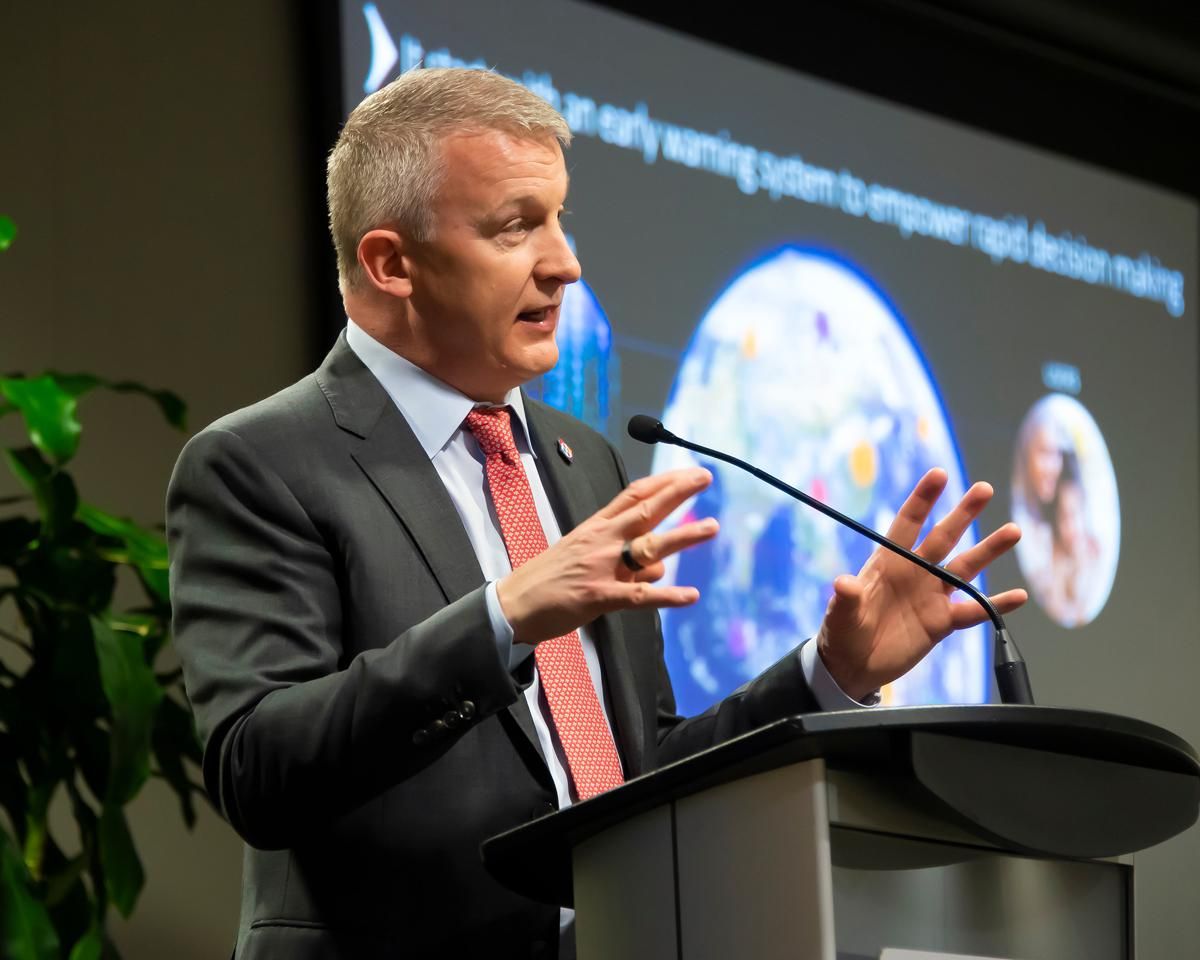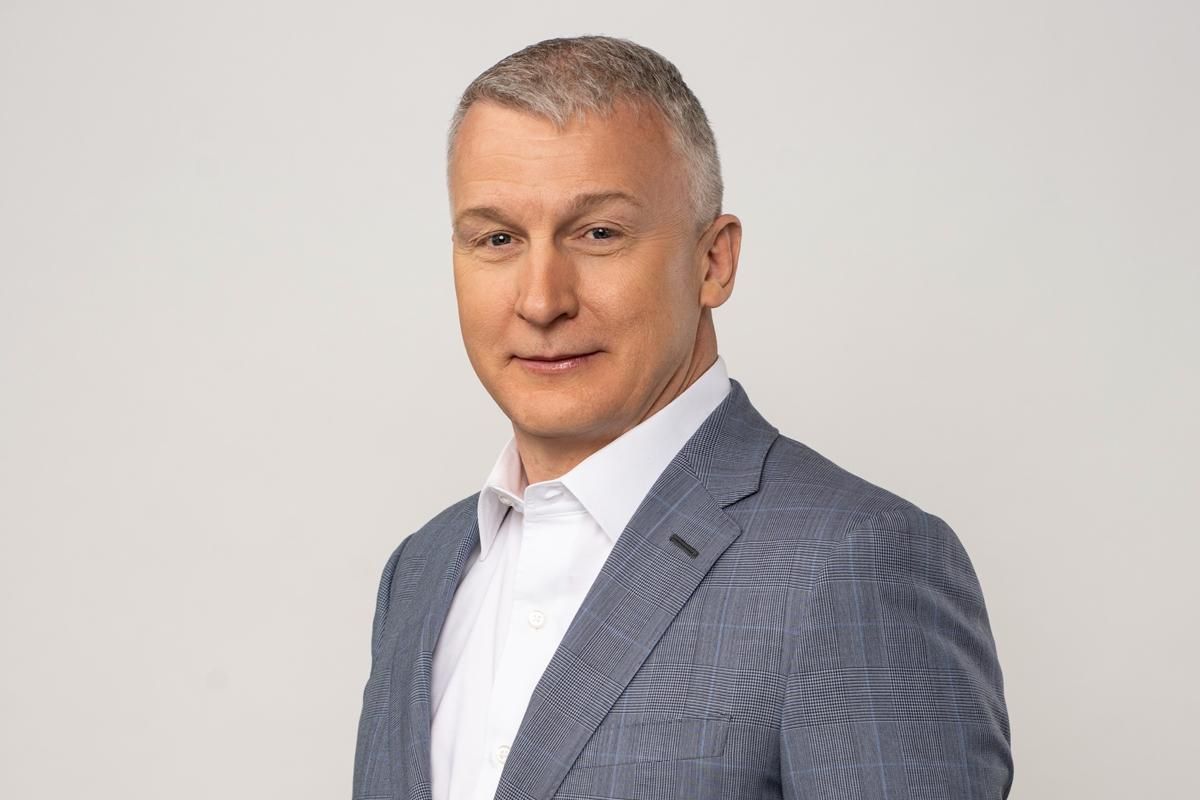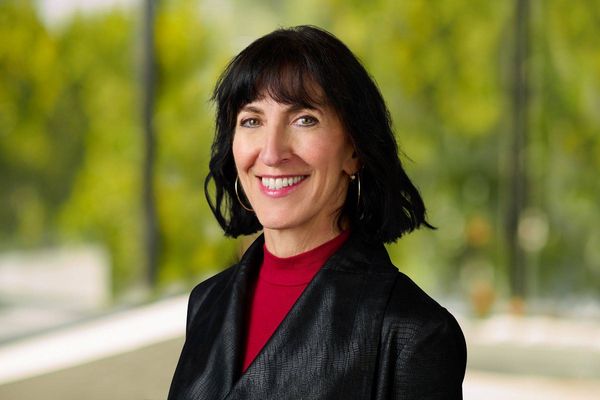Rick Bright, Ph.D., is an immunologist who has been working to address emerging infectious diseases for decades. Among his many accomplishments, Bright led and coordinated the U.S. and global medical countermeasure development for the 2014 MERS outbreak (another coronavirus). In 2020, Bright made headlines when he resigned from government service in protest over the Trump administration’s handling of the Covid-19 pandemic, specifically over the level of political interference over science and the spread of inaccurate information that he said was “dangerous, reckless and causing lives to be lost.”
Bright is the recipient of the prestigious Charles C. Shepard Science Award for Scientific Excellence, jointly awarded by the CDC and the World Health Organization and is currently senior vice president of pandemic prevention and response at The Rockefeller Foundation. The renowned scientist recently spoke with HealthyWomen’s editor-in-chief Jaimie Seaton about the dangers of antimicrobial resistance (AMR).
AMR occurs when bacteria, viruses, fungi and parasites develop resistance to the medicines that are used to fight them. AMR is a global health threat that makes it difficult and, at times, impossible to treat certain infections and diseases and increases the risk of disease spread, severe illness and death.
This interview has been edited for clarity and length.
HealthyWomen: Can you please describe your experience in AMR?
Rick Bright: This is such a critical issue that most people are impacted by and don't even know the impact. I found myself, as a director of the Biomedical Advanced Research and Development Authority (BARDA), working for years, investing in companies to develop new antibiotics to address the growing threats of antimicrobial resistance or bacteria organisms that are resistant to our available drugs, for the purposes of national security — because there are a number of bacterial organisms that terrorists can use, such as anthrax and tularemia, to cause a lot of harm, a lot of death, and attack another nation and attack individuals. So I had an interest in making sure we had an arsenal of antibiotics that would work against these deadly organisms if someone used them.
I kept it focused pretty much on national security, and even I was less aware, if not oblivious, to the growing threats of the bacterial organisms around us that are resistant to drugs — until it hit me personally.
HealthyWomen: How did AMR hit you personally?
Rick Bright: A few years back, I had a simple gardening cut — a nick from a plant on my thumb — and that infection quickly grew into a big problem. It became so infected that I went to seek emergency care in the United States, in Washington, D.C., as the director of BARDA, the largest organization funding the AMR crisis. And I found myself in a web of public health chaos, where there wasn't awareness among the doctors I was seeing to even look at and diagnose the problem.
I was passed from urgent clinic to urgent clinic because the urgent care doctors didn't see it as a problem, and when I finally made it to an emergency room a day later, I realized the crisis was upon me. They put me on an [IV] antibiotic immediately; it would have been the second antibiotic because the urgent care centers gave me an antibiotic that clearly wasn’t working. They sent me home, but the bacteria I was infected with were resistant to that antibiotic as well. I went back to the emergency room and they treated me with two additional antibiotics and an antifungal, but none worked. They scheduled me to move into the hospital for surgery to remove my thumb and as much of my hand and arm as needed to control and get rid of the bacteria that were now spreading up my arm.
It wasn't until the seventh antibiotic that they tried in the hospital before that surgery that they saw improvement. And immediately upon receiving that drug, I got a notification from the insurance company that it was an expensive drug, a novel drug, if you will, and they were not going to cover the reimbursement for that drug.
And so here I am, BARDA director in America, in one of the countries with one of the greatest healthcare systems and the recognition of drug-resistant bacteria, and the system I had to go through to be treated to get an effective drug was phenomenally cumbersome.
And the diagnostic assays that they used were ones developed 100 years earlier; a culture assay that takes six days to get a result, and then another day or two to figure out which drug might work. We have diagnostics on the marketplace today that could have told me that in less than two hours, and I could have been on the right drug. I could have not had a week stay in the hospital and then go home with another 10 days of treatment.
And I could have reduced my risk of what could have been a more complicated outcome. If this had gone into my bloodstream and become sepsis, then I really could have died from a cut in the garden. So that is my personal story.
I went back with a vengeance to look into the challenge of AMR and the marketplace, and how the drugs are developed and how they're reimbursed, how people have access to them, how they're tied to diagnostics. It is such a broken system that we need to fix what I call a marketplace failure because the huge growing problem of what we call this growing pandemic — silent pandemic all around us — is going to be the next major crisis in public health if we don't do something about it urgently.
HealthyWomen: It sounds like there are a number of different things going on there: It's not just the problem with the antibiotics, but they used the wrong diagnostic tests to begin with so that you lost time.
Rick Bright: Yeah, at BARDA, we invested in developing new diagnostic tools that can return results within the day, 12 hours, or some are even two hours now. When I went to the emergency clinic, I begged the doctor to slice open the blister that was there and take a sample and send it out to the lab for testing. She said it wasn't the standard practice, they don't do it, they're afraid to make it something worse. And then, on the second visit to the emergency room, I had to beg them once again to test it and send it out for sampling or testing to see what it was that was affecting me and how to treat it.
It was not at the forefront of their minds to use a rapid diagnostic or to use even any diagnostic. We're in the 21st century, and the doctors were guessing.

HealthyWomen: The World Health Organization classifies AMR as one of the top 10 global public health threats facing humanity, and it’s also been referred to as the next pandemic. Do you want to expand a little bit beyond your own personal story to give us a sense of the magnitude of the problem?
Rick Bright: It is huge. A recent analysis in The Lancet talks about nearly 5 million deaths associated with AMR in 2019, and about 1.3 million were attributed to bacterial antimicrobial resistance. It is a growing problem in big numbers, but what people may not realize is it's touching them in the everyday infections that they've heard about their whole lives, such as urinary tract infections that really impact a lot of women and others around the world. UTIs that go unrecognized and untreated or inappropriately treated are the things that are becoming more and more prevalent, and leading to worse and worse outcomes [such as] sepsis, and causing more and more people to die.
That is why WHO is calling this one of the top public health threats, but it's also why I believe, and many believe, that this is a pandemic tsunami upon us. And it's only getting worse because we're getting fewer and fewer drugs. It's becoming harder and harder to access appropriate tests and treatments in more places of the world.
And so, as we see with the SARS-CoV-2 virus [which causes Covid-19], the virus is continually mutating, largely unchecked and uncontrolled. Imagine the thousands of bacterial organisms that infect us every day that are doing the same thing. And imagine if we can’t control one virus right now, how can we control thousands of bacterial organisms all around us, on us, in our homes, in our communities, in our schools, just waiting for that opportunistic moment for you to have a little cut or something that exposes your blood or your skin to that bacteria and it takes hold and it can kill you?
HealthyWomen: After your own experience, how have you adapted your life? Do you walk around terrified all the time that you're going to cut yourself?
Rick Bright: No, and I don't think we should live in terror, but we should be aware of it, so when we get cut, when we get a nick or something, we need to know how important it is to treat ourselves. We need to make sure that cleaning practices are known — washing your hands, putting antibiotic ointment on or treating a cut with a Band-Aid, covering it up and seeking care is really important. Many people discount a simple cut in the kitchen, so they need to understand. We need to have a public health messaging campaign that emphasizes the need to clean that cut thoroughly and to watch it closely. If you see a change in redness or a blister or festering of that site, you need to seek treatment.
We also need to train our healthcare providers about the importance of using modern diagnostics to get an earlier read on what might be happening, what that organism might be and how to treat appropriately.
What we're seeing is so many of our healthcare professionals, with the best intent, clearly recognizing an infection and then just giving the lowest cost, most generic antibiotic without recognition of the growing rate of resistance of the bacterial organisms that they're going to see in their clinic.
Instead of walking in fear, I’ve become louder in advocacy for continued support for the development of new antibiotics that will address these drug-resistant bacteria and new diagnostics that will detect bacterial infections and characterize them even faster. But I've learned, and I learned the hard way, that even when we have those drugs and diagnostics, the work isn't done. Our advocacy needs to reach the hospital systems to put that new technology into the hospital, so it can be used by the doctors there.
We need to put the new antibiotics in the hospital formulary, so they're available. We need to work with Medicaid to set pricing that sustains the use of those antibiotics when they're needed, and to be able to reimburse for them, so companies will be incentivized to continue developing those drugs.
The solution starts with the individual and knowing they need to get treatment. It carries through to the doctor to recognize an infection, and then to the healthcare system to use the right tools early enough and the right drugs. The solution also requires our healthcare reimbursement agencies to reimburse for the use of the right drug. And, looking at the reduction in healthcare cost, reduction in deaths and reduction in further transmission of drug-resistant bacteria, all the financial incentives are there. But it's all fragmented and disconnected, and the people paying the price are those, like you and me, who get a simple infection that leads to death of our loved ones.
HealthyWomen: It's interesting that you're talking about the financial incentive. Do you think that enough is being done to try to develop new antibiotics, new drugs that can help?
Rick Bright: We're losing the collaboration from the private sector because they've invested large sums of money in development of new antibiotics that are specifically developed to address drug-resistant bacterial organisms. And they're investing billions of dollars into these new drugs, and then when they're developed, they're not put into the hospital formulary; they're not taken up and reimbursed appropriately, so these companies are going bankrupt. There's a number of small biotech companies that have invested heavily into developing new antibiotics and new diagnostics to address this challenge, and they only get so far, and without public sector support as well, either investment from BARDA or the NIH or other government investment and collaboration and public-private partnerships, those little companies go bankrupt.
Former competitors are now collaborating in new ways. Some private sector companies and partners are forming an alliance, such as the AMR Industry Alliance. They're bringing together their knowledge and information, and they're investing in these small companies to take them further. But even if they do that, the chance of success is low because of the lack of support from the pharmaceutical industry to sustain the manufacturing of these drugs and of the hospital to put them on the formulary, and then for the government to reimburse them at an appropriate rate.
So it's not just about the money. We need to invest and own the space, but we also need to make sure that we’re changing these practices of using the wrong drug because it’s cheaper.
HealthyWomen: Do you feel hopeful? Do you see a shift at all? I’m wondering if you think Covid sort of had a positive and a negative effect, like the negative effect being that it derailed efforts and took focus away, but positive in the sense that people got a wake-up call to how serious the problem is?
Rick Bright: A little bit of both. The problem — the challenge with Covid — is the world is singularly focused on Covid and so many other significant diseases have been neglected.
I want to be optimistic. As you've described in painting the picture, people will recognize that there are other threats among us — they are increasing, and there are things that we can do and need to be doing about them. I worry that with AMR, we've seen it today, sort of slowly penetrating society, and it is really perceived as a threat to [developing] countries or low- or middle-income countries. It’s perceived as a threat in places where they have different hygiene and food handling systems and waste handling systems, etc.
The high-income countries are not recognizing their ability to impact and slow and curtail this just yet. And by the time they do, it’s just like we see in Covid, where we see an outbreak or a surge in a new variant in India or in Africa somewhere or in Europe even, but we don't take the [preventive] actions necessary in the United States or other parts of the world. We wait until it’s a crisis on our own shore, and then we find ways to respond in a panic mode, where, if we connected this problem globally, and we … addressed it as a global challenge and if all countries contributed to a solution, then we could curtail the spread of AMR.
HealthyWomen: You mentioned urinary tract infections earlier, and I wonder if you could talk a little bit more about why women in particular need to be concerned about AMR. Just going into the hospital for childbirth, for instance.
Rick Bright: One of the things that pandemics reveal are long-standing structural fault lines in society, and AMR is no exception. We see in the U.S., and many places around the world, in many settings, that women and children and other vulnerable groups face challenges to accessing primary care. Accessing primary care relies on basic infrastructure like roads, transportation and social networks, and there are so many of these factors that are challenges for mothers and women, and every minute counts when you're dealing with an infection. For gynecological care and for childbirth, etc., women are exposed to more organisms. Women are the ones that are generally doing more around the house and more in the kitchen that might expose them to more household nicks and constant injury. And they're just in a position with how they’re exposed to be at a much higher risk of infection from bacteria. UTIs affect about one in two women.
HealthyWomen: Is there anything that individuals can do to fight and mitigate the effects of antimicrobial resistance?
Rick Bright: It's just vigilance. Recognize the risk and take appropriate behaviors when you are cut, when you feel you're exposed. Seek healthcare guidance and treatment if you see an infection not healing or looking like it’s getting worse. Don’t be so quick to take an antibiotic for just anything. A lot of people have old antibiotics at home, and when they feel they have a little congestion, a little tightness in their chest or a cut, they run to that cabinet and they take an old antibiotic that may have been prescribed for some other infection. We need to toss out those old antibiotics and not run to those for treatment every time we think we might be exposed to bacteria, have some sort of infection. We need to seek healthcare guidance and get diagnosed for those treatments. And we need to recognize that if we do run to the cabinet and take those antibiotics, number one, they may not work. Number two, they might make this global problem with antimicrobial resistance even worse. We need to take personal responsibility to decrease the risk of antibiotic resistance instead of making it worse.
HealthyWomen: Just one follow-up to that. Everyone is using hand sanitizer constantly due to Covid: Is that something that people should not do because of AMR? Is it making AMR worse?
Rick Bright: Well, appropriate hand sanitation, washing your hands frequently and hand sanitizer are helpful in taking bacteria off your hands. You can overuse the hand sanitizer, you can overwash your hands, and you'll create dry skin and cracks in your skin, and each of those cracks is an opportunity for bacteria to actually infect you and get into your bloodstream. And so we really need to be prudent.
HealthyWomen: Is there anything that I haven’t asked within the scope of this article that you want to add?
Rick Bright: It's important to recognize that the challenge of AMR is one of the whole of society and that solving the crisis involves individuals and what they do in their home with their family in the community. It involves the public sectors such as our governments and CDC, and hospitals and public health centers, to make sure that they are vigilant and using the right technologies to diagnose and treat quickly and responsibly and appropriately. It also involves the private sector in how the companies are developing drugs and making sure that they're not promoting inappropriate use of antibiotics. It also helps to financially support a marketplace that will ensure we still have antibiotics that work when and where we need them.
I want to add one more thing and it is one of the most important as well, and that is the surveillance systems. Two of the worst things I think that can happen with the emergence of new drug-resistant bacteria organisms are, one, that we’re blindsided by it because we don’t have a global surveillance system that's tracking and monitoring for the emergence of these new drug-resistant bacteria. And the second is an inappropriate response to it. We need to have a global surveillance system, and one of the things I'm working on at the Pandemic Prevention Institute at the Rockefeller Foundation is the ability to have surveillance around the world, monitoring for new bacterial organisms that might be spilling over from the animal population into the human population and the organisms that are changing and evolving over time.
- 15 Minutes With 2022 - HealthyWomen ›
- Expert Perspectives - HealthyWomen ›
- How Antimicrobial Resistance (AMR) Complicates Other Health Conditions - HealthyWomen ›
- You, Too, Can Fight AMR! - HealthyWomen ›
- How Antimicrobial Resistance (AMR) Complicates Other Health Conditions - HealthyWomen ›
- Preparing for the Next Pandemic - HealthyWomen ›
- AMR 101 With Dr. Uzma Syed - HealthyWomen ›
- Antimicrobial Resistance and Women - HealthyWomen ›







